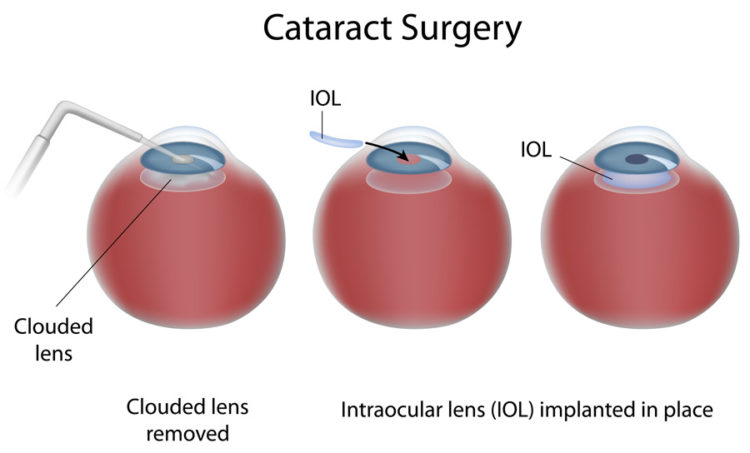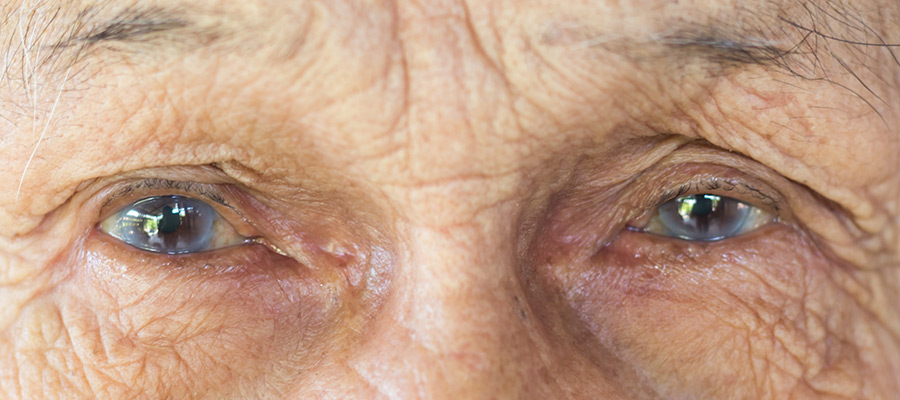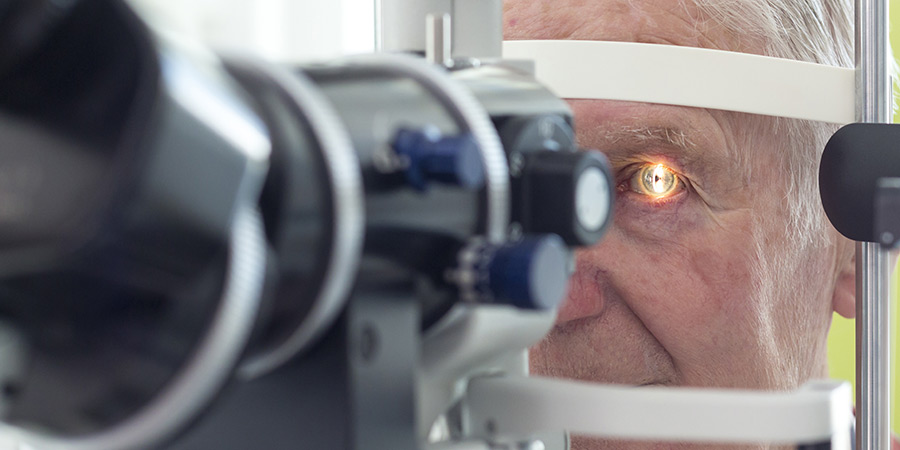“With any type of cataract surgery, your outcome depends in large part on the skill and experience of your eye surgeon,” the American Academy of Ophthalmology (AAO) website.
If you or a loved one has cataracts, it’s helpful to know when cataract surgery is necessary, how it works, and what the results will look like and what your results will be. Continue reading to learn more about your options.
What is cataract surgery?

Cataract surgery involves making a very small incision in the cornea to remove the clouded lens. The natural lens is then replaced with an artificial implant called an intraocular lens, or IOL. Cataract surgery is the only effective form of treatment for cataracts. There are no eye drops or other treatments that can help manage symptoms. The only solution to visual problems caused by cataracts is to have them removed.
Our Current Results:
At Rosanova Eye, out latest outcomes analysis has shown that our patients see far and near without glasses equal to or better than Lasik patients or anything reported in the literature for Refractive Lens Exchange or cataract surgery.
Dr. Mark Rosanova will be happy to discuss with you how well and consistently The Rosanova Method of Custom laser cataract surgery enables our patients to see without dependence on glasses.
How do I know if I need cataract surgery?

The decision to have surgery is multifaceted and personal. Doctors recommend cataract surgery when your degenerating natural lens starts to affect your quality of life. Recognizing this can be difficult, especially since cataracts tend to develop slowly. This is why eye exams are critical— a comprehensive eye exam can help your doctor detect lens changes early on, which provides the best chance of preventing vision loss.
As you slide past 40 years old, your lens starts to degenerate, causing what’s known as Dysfunctional Lens Syndrome (DLS) even before you have a full blown ‘cataract.’ (see our discussion of DLS in the Cataract Section) though the symptoms can be just as annoying.
Here are a few examples of how DLS and cataracts can impede your daily activities:
- Driving at night is difficult and feels unsafe due to decreased night vision and/or blinding glare from car headlights.
- Reading or doing other close-up work is hard even when using reading glasses.
- Your sight makes you worried about your safety when cooking, cleaning, or simply walking around the house.
If any of these examples ring true for you, you may want to take our CATARACT SELF-TEST or call to make an appointment with Dr. Mark Rosanova at one of our offices.
How safe is cataract surgery?
Cataract surgery is a very low-risk procedure. Dr. Rosanova has performed the procedure thousands of times, and major complications are rare. It’s important to note, however, that any surgery can come with risks. It’s possible for some complications to be triggered by pre-existing conditions such as diabetes, autoimmune conditions, or other eye conditions.
At Rosanova Eye, we take extra care in considering your candidacy for cataract surgery. Your medical history, current health, and the stage of your cataracts will all be thoroughly evaluated before a recommendation is made for cataract surgery.
How does traditional cataract surgery work?
Cataract surgery is a fairly simple outpatient procedure. Most surgeries only take around 30 minutes.
Here are the basic steps:
The surgeon anesthetizes the patient’s eyes with numbing eye drops, which results in a painless procedure. They may also give the patient a mild sedative so that the patient remains relaxed. The surgeon makes a small incision through the surface of the eye to access the lens. An ultrasonic device is inserted through the incision to break apart the lens and remove these broken pieces.
The surgeon then inserts an artificial lens into the eye through the incision. The intraocular lens, or IOL, then unfurls to act as a permanent replacement for the natural lens. No stitches are required, as the incision is small enough to heal on its own.
What is Laser, Custom Cataract Surgery?
The custom cataract approach gives the patient the opportunity to obtain better quality vision than basic cataract surgery. This approach can minimize the need for prescription eyeglasses for distance and/or near after surgery. This particular type of surgery requires an extensive pre-surgery examination that helps Dr. Rosanova determine how to address specific conditions such as astigmatism.
The Femtosecond Laser is a revolutionary new tool that offers the following advantages:
- Greater precision, accuracy, and consistency in incision and openings versus those made by hand. This leads to a greater chance of achieving your best possible vision.
- Decreasing the majority of moderate corneal astigmatism.
- Less potentially damaging ultrasonic and fluidic collateral damage to the inside of your eye.
- Shorter operating times.
- More precise placement of the new lens, optimizing the postop vision you desire.
Dr. Rosanova feels this latest technology is particularly suited for patients with:
- Floppy Iris Syndrome, an irreversible condition caused by a) alpha-blockers used in treating hypertension and prostate disease. You can have this even if you have not had prostate surgery. b) Pseudo Exfoliation Syndrome, an inherited disorder found especially in people of Northern European Ancestry.
- Very dense or “hard like a rock” cataracts.
- Certain diseases or degenerations of the cornea including Fuch’s dystrophy. This includes certain advanced aging changes.
- Previous Vitreous surgery or Retinal detachment surgery. Systemic diseases that compromise the small vessels in the retina such as diabetes and hypertension.
Please see our online brochure for more details or make an appointment with Dr. Mark Rosanova at any of our offices for an evaluation and discussion.
Verion
No two eyes are the same – not even yours! That’s why before your procedure, Dr. Rosanova and his expert staff will use the VERION ™ System to obtain a “fingerprint” image of each eye before your procedure. It doesn’t hurt, and nothing will touch your eye. You’ll simply sit in a chair while a few key images and measurements are taken. In late 2014, Dr. Rosanova and his team were one of two practices in the Chicago area to first use this exciting new technology. This detailed “fingerprint” image contains all of your specific eye measurements. To ensure the most accurate results possible, Dr. Rosanova will use his unique experience and your digital measurements. This is part of our unique protocol for customizing every step of your Lensx Laser pre-treatment and your cataract surgery.




Will I need glasses after cataract surgery?
The choice is yours!
Various intraocular lenses (IOL) to decrease dependence on glasses and correct astigmatism have been in use and regularly updated for the past 15 years.
However, it has only been within the past 3-5 years that the latest technology, diagnostic instruments, programs/formulas, planning, and techniques have made the selection and implantation of these IOLs much more accurate and reproducible.
Today, with The Rosanova Method, you have the option to enhance your full range of vision and/or eliminate any astigmatism without the dependence of glasses or contact lenses. For you, this means clearer, more natural and optimized vision and fewer potential side effects.
The femtosecond laser, diagnostic instruments, lens power calculation formulas, image guided surgery planning tools and Dr. Rosanova’s extensive, unique experience in this arena make these lenses more viable than ever before.
Please see our online brochure for more details or make an appointment with Dr. Mark Rosanova at any of our offices for an evaluation and discussion. At Rosanova Eye, we are dedicated to providing patients with the most advanced treatment available.
To better understand your visual needs and what choices you have, please take our Custom Cataract Visual Assessment test.
At Rosanova Eye, we are dedicated to providing patients with the most advanced treatment available.
What are the IOL options?
Dr. Mark Rosanova only uses the best intraocular lenses for each patient. Depending on your visual needs after surgery, he may recommend any of the following:
- Monofocal IOL – The Monofocal Lens can correct either up-close or distance vision. You may need glasses to correct vision after surgery.
- Multifocal IOL – The Multifocal lens corrects vision up close and in the distance.
- Toric IOL – The Toric lens correct astigmatism.
- PanOptix Trifocal IOL – The PanOptix Trifocal lens corrects vision up-close, intermediate and in the distance.
What is the best IOL?
The PanOptix Trifocal IOL is the latest IOL technology released by Alcon! Dr. Rosanova is trained on the PanOptix Trifocal IOL procedure and highly recommends it to his patients who want to correct the most visual fields and reduce the risk of depending on glasses after surgery. Dr. Rosanova is one of the few cataract surgeons in Chicago offering the PanOptix Trifocal IOL. Click here to schedule an appointment to find out if you are a candidate.
Learn more about the PanOptix Trifocal IOL from Alcon.
Meet the PanOptix® Pro Lens at Rosanova Eye
At Rosanova Eye, we’re proud to offer the latest in cataract surgery innovation: the Clareon® PanOptix® Pro Trifocal IOL from Alcon.
What Makes It Different?
This next-gen lens builds on the success of the original PanOptix® with advanced ENLIGHTEN® NXT Optical Technology, offering:
94% Light Utilization for brighter vision
50% Less Light Scatter for reduced halos and glare
16% Better Contrast between intermediate and distance vision
Why It Matters
Clearer vision at all distances
Whether you’re reading up close, working on a computer, or driving, you’ll notice improved clarity.
Less reliance on glasses
Many patients enjoy greater visual freedom after surgery.
Improved night vision
Fewer halos and glare make nighttime driving and low-light conditions more comfortable.
Enhanced Surgical Precision
As the first Alcon lens in the U.S. with a preloaded delivery system, the PanOptix® Pro allows for even more precise placement and smoother outcomes.
Available Now
Dr. Rosanova is among the first U.S. surgeons to offer this breakthrough technology. Experience the next evolution in visual freedom—only at Rosanova Eye.
Can cataracts grow back after surgery?

There is no way for a cataract to return since this lens is removed. An IOL is made of acrylic/plastic material that cannot become clouded. A secondary cataract can form when the area behind the lens, known as the lens capsule, becomes clouded with proteins -much in the same way and for the same reasons that the original cataract formed.
Cataract Treatment, Chicago, IL
The treatment is a YAG laser capsulotomy. From a patient’s perspective, the procedure is much easier than the original surgery. It is a simple out-patient procedure.




